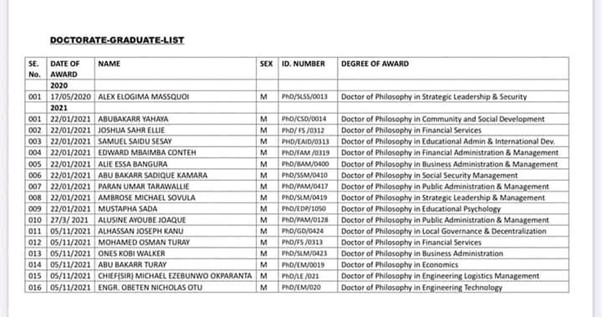Women’s Health: a key to the development and transformation of Sierra Leone
A weeklong conference on development and transformation of Sierra Leone is underway in Freetown. This aims at mapping the journey to getting Sierra Leone to a middle income nation. What an ambition. This writer, a women’s rightist quite believes that, achieving this dream is contingent upon improving the health of women in Society, and below is an analysis that may guide the conference participants in the development of actionable ideas that will include women’s welfare. (Photo: Alhassan Fouard Kanu)
The reproductive years for women are of central importance to their lives, their families and communities, and the next generation. During these years, women not only bear and raise children, but are active members of society in many ways (as workers, leaders and key actors in social change and development) and have the greatest potential to deliver not only for their own lives, but also for broader development.
Since child bearing is a key part of the lives of most women in Sierra Leone, maternal health probably has an important effect on their ability to fulfil this potential. The MDGs have identified maternal health as a key development outcome, and thus assessment of the importance of improving maternal health as a development goal is essential, which is the focus of this article.
Maternal health most directly affects a woman’s own health and survival and that of her newborn child. It is however important to note that, maternal health is linked to women’s lives not only as a health issue. A woman’s maternal health is affected by, and could influence her status and empowerment as an individual.
As a member of a family, maternal health affects the health and education of a woman’s children and the finances and welfare of her household; whereas in her role in a community, maternal health affects a woman’s and her nation’s productivity. Maternal health is therefore, not only central to women’s potential, but also has telescopic, ripple effects for broader development concerns facing not only our country but the world at large.
Maternal morbidity is a serious issue in our country. Most of our women, especially the rural poor, have physical or mental disabilities every year because of complications of birth or its management.
Every year, nearly one thousand maternal deaths occur in Sierra Leone. Statistics suggest that, a woman in Sweden has only a 1 in 29,800 risk of death related to pregnancy and childbirth in her lifetime, whereas the risk for a woman in Sierra Leone is 1 in 6. The million dollar question though, is why maternal mortality does not improve in Sierra Leone. I suppose some of the answers include the uneven and inequitable improvement in the use of maternal health services, the inequalities in the distribution of services for maternal health, where the poorest women have the lowest service coverage. Furthermore, the low status and empowerment of women affects their access to and use of maternal health services. With sincere appreciation to the Free Health Care Initiative; this scheme is positively impacting the lives of these vulnerable women and their children.
Enablers for improved women’s status: Education and Employment
As WHO noted “maternal mortality is an indicator of disparity and inequity between men and women and to an extent, a sign of women’s place in society to their access to social, health, and nutrition services and to economic opportunities”.
Education and employment are termed enabling factors since they can be instrumental in enabling women to gain knowledge, confidence, skills, and opportunities that they need to increase their social and economic status and power in the household and in society. These form the 3 Es (Education, Employment and Energy) the president considered as the nation’s resources to achieve the dream of becoming a middle income country.
Examining the effect of women’s education on maternal health, extensive reports show that women’s education increases the use of maternal health services. Educated women are more likely than are uneducated women to use antenatal care, to use it early and frequently, and to use trained providers and medical institutions.
Similarly, education is positively associated with safe delivery and an increased use of postnatal care. Education results in substantial improvements in a woman’s own health as a mother, and also have positive intergenerational effects on the health and nutrition of her daughters and their households.
Women’s economic opportunity (gainful or paid employment, status at work etc.) also has the potential to affect maternal health. Employment is associated with reduced maternal morbidity and mortality and increased use of maternal-health services. Experiences and roles as economic provider might empower women through increased control over income which, in turn, may increase their power in decision making about health care and their ability to access and pay for the services that they need when they are pregnant.
A woman’s education and employment status enhance their decision-making in the household, which is a more direct measure of women’s ability to make crucial life choices. Women’s decision-making on key aspect of life is associated with an increased use of maternal-related services. Moreover, the stronger the woman’s decision-making power, the greater the effect on maternal health.
The above analyses of maternal health and the enabling factors for the improvement of women’s health underscore the importance to educate the girl child, provide job opportunities and other gainful engagements for women. This will definitely empower them at all levels: at the household, community and national. Such measures will enormously contribute to efforts in the development and transformation of the nation.
Over to you all at the conference, kindly ensure actionable recommendations are made that will capture the ENABLERS that are pivotal in improving women’s lives and that of the nation.
By Alhassan Fouard Kanu
Stay with Sierra Express Media, for your trusted place in news!
© 2012, https:. All rights reserved.





